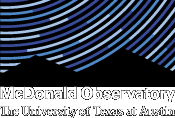Astronomers Test Einstein in a New Regime Using Pair of Burnt-Out Stars
AUSTIN, Texas — A team of astronomers led by researchers from The University of Texas at Austin has confirmed the emission of gravitational waves from the second-strongest known source in our galaxy by studying the shrinking orbital period of a unique pair of burnt-out stars. Their observations tested Albert Einstein's theory of general relativity in a new regime. The results will be published soon in The Astrophysical Journal Letters.

